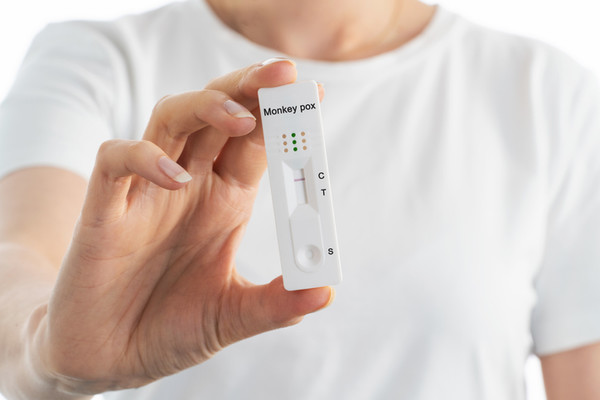As the community transmission of mpox increases, pharmaceutical companies capable of dealing with the virus are attracting attention.

On Tuesday, the Korea Disease Control and Prevention Agency (KDCA) confirmed that three more patients with mpox who have not traveled abroad were identified, bringing the total number of confirmed cases to 16.
The three new patients all developed symptoms within three weeks of onset and are suspected to have contracted the virus domestically.
The authorities are conducting detailed epidemiological investigations into the risk factors and infection routes.
As the number of mpox cases continues to rise, diagnostic kit companies capable of testing for mpox infection are attracting attention.
Last year, as weekly reported mpox cases exceeded 7,000 worldwide, Korean pharmaceutical companies proactively developed diagnostic kits.
In June 2022, Genes Laboratories, a subsidiary of GC Holdings, developed an mpox diagnostic kit that can confirm the infection within 70 minutes and has high analytical sensitivity and specificity.
MiCo BioMed became the first company in Korea to obtain an export permit for its mpox polymerase chain reaction (PCR) diagnostic kit from the Ministry of Food and Drug Safety in September of last year.
The company also conducted clinical trials on the product at the Pasteur Institute in Senegal in July last year, and the kit showed a “flawless” positive and negative confirmation rate.
Bioneer has developed the AccuPower Monkeypox Detection Kit, a diagnostic kit that can extract DNA from patients suspected of having monkeypox and shows results within 90 minutes with high sensitivity.
Wells Bio, a subsidiary of Access Bio, and Genematrix have jointly developed a diagnostic kit for monkeypox.
According to the two companies, the diagnostic kit improved the speed and convenience compared to existing products by shortening the test time from 1-2 hours to the 40-minute range.
There are also efforts to develop a mpox vaccine in Korea.
HK inno.N has set a two-track strategy to develop an mpox vaccine by adding the mpox indication to its existing second-generation smallpox vaccine and developing a third-generation vaccine that can provide immunity against both smallpox and mpox.
HK inno.N is currently conducting clinical trials to add the mpox indication to its second-generation smallpox vaccine. The clinical trial is currently in the primate testing phase, with the company having completed a contract with a contract research organization (CRO) capable of conducting primate testing last month.
HK inno.N developed its second-generation smallpox vaccine in 2009 to respond to public health emergencies such as bioterrorism. Today, it is primarily used to vaccinate military personnel and emergency responders.
The third-generation vaccine is also being tested on primates for monkeypox adaptation and on mice and beagles for smallpox.
HK inno.N is developing the third-generation vaccine in a subcutaneous injection form, which is more convenient and safe to administer. The second-generation vaccine uses bifurcated needles that require subjects to receive multiple shots.
The current mpox vaccine available in Korea is Jynneos, developed by Bavarian Nordic, a Danish biotech company.
While the vaccine was originally developed as a smallpox vaccine, it expanded its indication to include mpox.
The Korean government imported 10,000 doses of Jynneos, which can vaccinate 5,000 people, and began pre-vaccination for essential medical personnel in August of last year.
Related articles
- Korea confirms 9th mpox patient with no history of overseas travel
- Korea confirms 3 new mpox cases in less than a week
- Korea confirms 10 additional mpox cases since Friday
- Korea reports 17 more mpox infections last week
- Korea's mpox caseload increases to 60
- ‘70s smallpox vaccine can offer up to 80% protection against mpox: study
- Korea to downgrade Mpox infectious level to Class 3 while elevating calssification for syphilis

